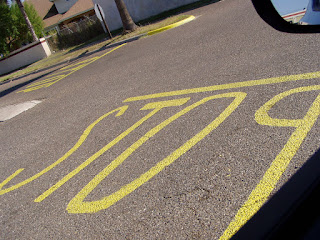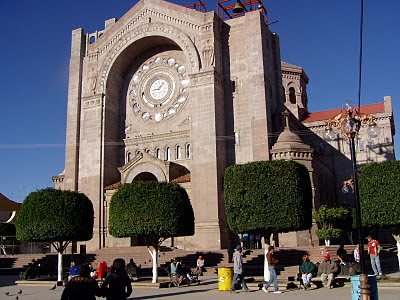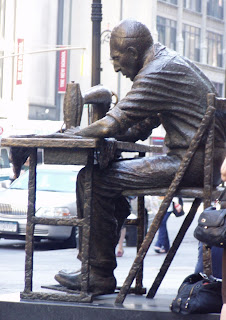The city of Matehuala is in the Mexican state of San Luis Potosi (SLP). There is also a city named San Luis Potosi. This is the general area in Mexico where the DEA agent was abushed and killed by the drug people. The highway that leads to SLP is on the US State Dept's "do not travel" list.
So why did I go?
When I began my genealogical journey, I had no idea that I would travel to this part of Mexico in search of family roots. As I discovered this fact and that one, a picture began to develop that had some missing pieces. It soon became evident that a trip to Matehuala might help me find the missing pieces of the puzzle. I told myself that this would probably my
first trip there. I was right. I will have to go back.
MATEHUALA
Matehuala was founded in 1590. The name comes from the Chichimeca Indian dialect that translates to "Don't come here." This was their chant to the Spanish invaders. The city is at an elevation of about 5000 feet above sea level.
The population, as far as I was able to determine from the locals, is between 100,000 and 150,000. The number seems high when you consider the city's commercial base and the land area. I conclude that there are lots of people in a small area.
Most of the businesses are small, maybe family-owned. I did not see any fast food chains such as McD, pizza, or BurgerK. This means that the food is authentic Mexican fare. The servings are generous and the prices very affordable. The only retail giant invader was the WalMart as you enter the city from the south.
When I was there, the temperature was perfect from 55-75 degrees. I read that the average temp is about 67, although the heat in May can be in the 100s.
IMMACULATE CONCEPTION CHURCH
Actually the church changed names when it went from a parish and a church to a cathedral. It is now called La Catedral El Santuario( This church was started in the mid-1700s). This was my first stop since my grandparents were married here and my father and aunts were baptized here. I go there early in the morning, hoping to meet with someone about church records. The morning mass had started and I thought of waiting outside, but it was too cold to sit so I sat through the mass. No there was no lightening strike while I was in there.
There was a small group of parishioners, but they were dedicated. I wanted to take pictures but they would not leave. After the mass they started praying the rosary and then something else.

The colors on the columns are from the stained glass.
I had to take a picture of the confessional. It brought back many memories of when I was in parochial school and we had to go to confession every Friday. I don't think I would confess here. There is no privacy. The benches on either side is where people wait their turn. I need a sound-proof booth like they use at the Miss America Pageant.

There were many saints in the church. Some in glass cases with a kneeling place and a donation box. The people I saw, prayed, kissed the glass, and dropped their coins in the box. There were no wipees for the glass cases.
It turned out that the church records were kept at an office a block away from the church. I was looking for death records for an uncle that my aunt said had died as a boy. I was also looking for information on an aunt that I did not know about, that was born a year before my grandmother died. The record keeper said that they did not keep death records. That I would have to go to the Presidencia Municipal - city hall.
Presidencia Municipal
This building is in the typical Mexican design. It is two stories, but open in the middle. There is a kind of courtyard in the middle, surrounded by offices. Of course my destination was on the second floor. I am always wondering how people with disabilities get to the second floor of a public/government building to conduct business.

I had learned from my newly discovered relatives in Monterrey that a cousin of my father's had been "Presidente Municipal," something like the mayor or city leader. I had been told that his picture was on display. I asked about it and was given permission to take a picture. The former "presidentes" are displayed in a large conference room.

The man in the center photo was Roberto Vidales, President from 1941- 1943.
Panteon Hidalgo (Hidalgo Cemetery)
One of the key figures in my search was my grandmother, Estefana Villanueva. I did not know much about her other than she died young, when my father was about 3 and my aunt was 9. When I found her death record, I found out that she died in 1925 at the age of 30 years and that she had died on an "internal tumor," a cancer is assumed. However, the death record states that she did not die at her address, but at someone else's house. Who, what, where, when, how?
There are two cemeteries in Matehuala. This one was two blocks away from the hotel. I learned that this cemetery is 200 years old. I came to the cemetery and asked to see her burial record. She was buried on November 17th, 1925. She died at 8 p.m. on November 16th. I thought it odd that she was buried the next day. I have since learned that this practice is not uncommon. Apparently not all bodies are embalmed, especially not back in 1925. The cemetery man told me that she was buried in section 2 and that he would show me where.
The cemetery covers one large city block and is bordered by walls on all sides. I expected to see neat rows of dead people. Instead I saw that Section 2 encompassed a strip of about 30 yards from wall to wall. I got the cemetery image below from Google Earth and drew lines to give you an idea. He said that the records did not indicate if she was buried in Section 2 North or South. The only clear path was the one down the middle from the entrance to the back wall.
The Cemetery man verl calmly told me to just look for the name on the markers. I did not know if there was a marker, let alone a name still on it.
I was stunned. How do I do this? He calmly told me to just go through or over the tombs. This is how people do it every day. The tombs were facing every which way facing north, south, east, and west. I always thought that there was a cemetery rule about facing east. It seemed to me that some of the dead had their legs over those of their neighbor's.
Some of the tombs were is very bad shape, with cave-ins. Luckily there was no one visible.
I was hoping that my grandmother was not a dirt plot or a nameless marker. I had no idea if she had any kind of marker.
Luckily, after about 45 minutes of tomb-climbing, I found her tomb.
I took pictures of the site at 360 degrees and copious notes to be able to locate the tomb easily next time.
 |
| ESTEFANA VILLANUEVA |
The Rest of the Story
The addition of "de Vidales" was an afterthought. I don't know who bought the marker or who decided on the lettering. But, as I piece my story together, I decide on the following
My grandmother gave birth to a little girl in 1924, a year before her death. That same year, my grandfather fathered a male child with another woman. When my grandmother died she did not die at home, but at the house of her aunt, on Altamirano street. My Monterrey relatives confirmed who lived on that street. I am thinking that my grandmother knew about the affair and moved out of the house. She may or may not have been ill at the time. When my grandmother died, the new woman moved in with her little boy. I knew this man as my father's half-brother. They were close as they grew up together. My aunts were sent to live with relatives, as the new woman did not want them in the house, and were a source of conflict between my grandfather and her - no Brady Bunch here. My father and his sisters, disowned my grandfather and one point my father did not use the name "Vidales." He went by his mother's maiden name "Villanueva" and his grandmother's name "Argueta." Later he went back to using "Vidales." I am guessing that this accounts for the tomb marker's alteration. Until I learn something to the contrary, this is my story.
My next entry will show more of the city - the tourist's view.

























































